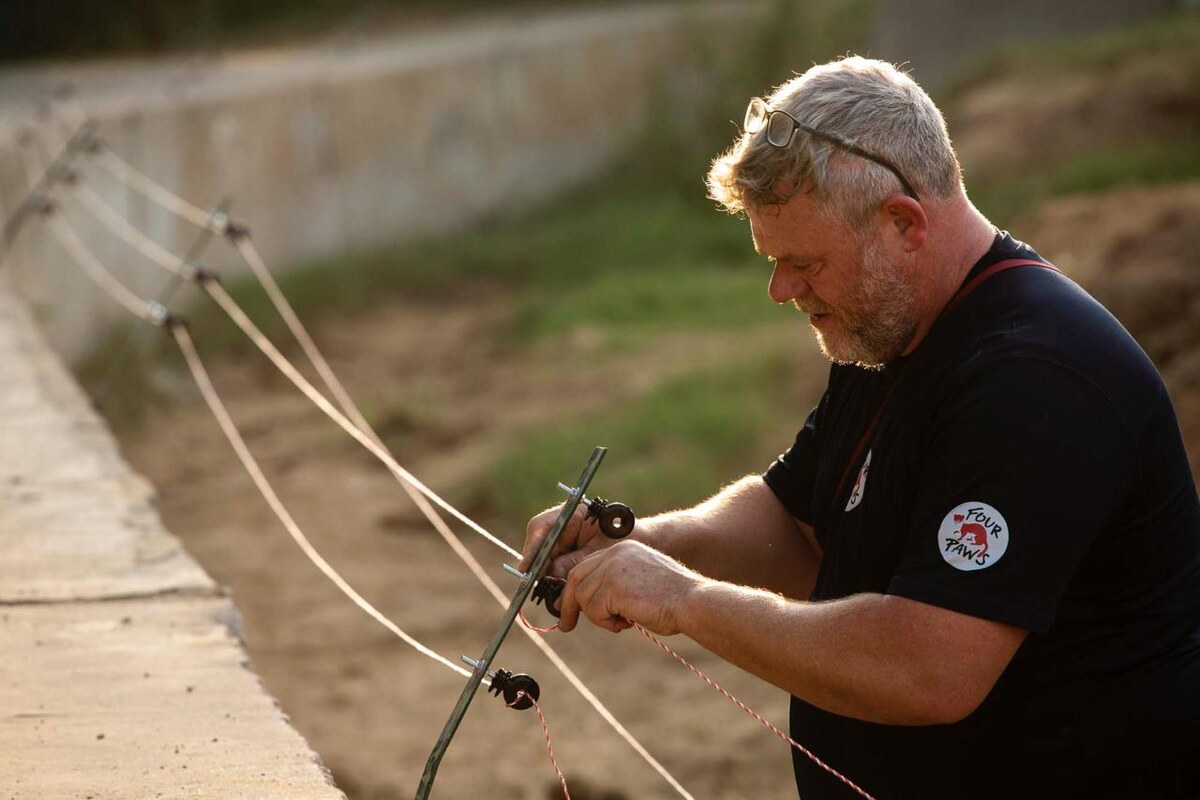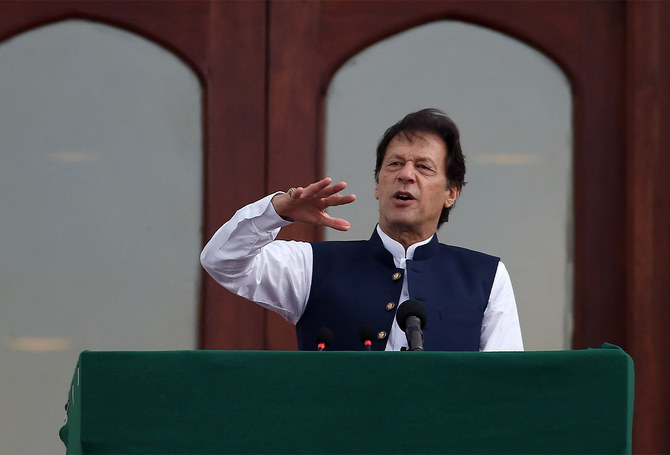ISLAMABAD: Pakistan’s planning minister Asad Umar on Wednesday shared the gist of a letter which Prime Minister Imran Khan recently described as evidence of a “foreign-funded conspiracy” to topple his administration with a group of senior journalists.
Faced with a no-confidence motion against him in Pakistan’s national assembly, the prime minister addressed a public rally of his party workers and supporters on Sunday in which he said that some international powers were not happy with his government and wanted to bring it down since he was pursuing an independent foreign policy.
Khan maintained he had also been threatened “in writing” while mentioning the letter which he said could be used to substantiate his claim.
The document has remained under discussion since then, though the government has only disclosed some of its contents now during the media interaction in the prime minister’s presence.
Asked about its essence, Arshad Sharif, a journalist who attended the meeting, told ARY news channel it underscored international displeasure with Pakistan’s ruling administration while mentioning the no-trust motion against Khan.
“If the vote of no-confidence succeeds, Pakistan’s international problems will reduce,” he said while summarizing the contents of the letter. “However, if Prime Minister Imran Khan survives the vote of no-confidence, Pakistan will face arm-twisting. There are very clear threats in relation to this.”
He said the document was briefly displayed to journalists from a distance and it was not read out due to Official Secrets Act.
“[The prime minister] said these things had been shared with the army chief and DG ISI [director general of Inter-Services Intelligence],” Sharif continued. “He also maintained there would be an in-camera parliamentary session in which foreign minister Shah Mahmood Qureshi would convey these things [to lawmakers].”
“The federal government, prime minister and his cabinet ministers are explicitly calling it a threat and an attempt to influence Pakistan’s foreign policy,” he added.
They were also looking at it as an international conspiracy to oust the prime minister, he said, for which there was now an “official document in existence to prove their concerns.”
According to Kashif Abbasi, another journalist who was present at the meeting, the letter also highlighted concerns related to the prime minister’s recent visit to Russia where he held a long meeting with Russian President Vladimir Putin shortly after Russia invaded neighboring Ukraine.
He said Khan’s trip to Moscow was described as his personal decision, not Pakistan’s state policy.
“The vote of no-confidence is arriving,” Abbasi said whil recalling the gist of the letter. “If it succeeds, we will forgive everything. If it fails, the coming days will become tough [for Pakistan].”
Earlier in the day, a Pakistani court expressed “confidence” that Prime Minister Imran Khan would not publicize secret documents while hearing a petition filed by a citizen in the context of the same letter.
“The worthy Prime Minister is an elected leader of the treasury benches,” the Islamabad High Court said in a written order. “The Court is confident that as an elected Prime Minister he would not disclose any information or act in breach of section 5 of the Official Secrets Act, 1923 nor the oath taken by him under the Constitution. Any decision taken by the worthy Prime Minister has to be in consonance with his obligations under the Official Secrets Act, 1923 and in letter and spirit of the oath of the office.”
It added the court had full trust the prime minister would not reveal any information which “may be prejudicial to the national interest and national integrity of Pakistan.”
The court said “the petition stands disposed-of in the above terms because passing a restraining order would unjustifiably reflect lack of confidence in an elected Prime Minister.”
Government shares gist of letter proving ‘foreign conspiracy’ against PM Khan with journalists
https://arab.news/pdpnm
Government shares gist of letter proving ‘foreign conspiracy’ against PM Khan with journalists

- The document purportedly says Pakistan will face international ‘arm-twisting’ if the prime minister survives no-confidence
- The government is viewing the document as a threat and an attempt to influence the country’s foreign policy
World Economic Forum says Pakistan now world’s sixth-largest solar market

- Pakistan’s “rapid adoption” of solar energy provides valuable lessons for emerging markets, says WEF
- Says declining solar panel prices, skyrocketing electricity tariffs reasons for Pakistan pursuing solar energy
ISLAMABAD: Pakistan is now the sixth-largest solar market in the world and its “rapid adoption” of solar energy provides valuable lessons for emerging markets, a World Economic Forum report said this week as Islamabad tries to dodge rising fuel prices through renewable energy resources.
Pakistan’s energy sector has long struggled with financial strain due to circular debt, power theft and transmission losses, leading to blackouts and high electricity costs.
Experts say Pakistan has ideal climatic conditions for solar power generation, with over nine hours of sunlight in most parts of the country. According to the World Bank, utilizing just 0.071 percent of the country’s area for solar photovoltaic (solar PV) power generation would meet Pakistan’s electricity demand.
According to the National Electric Power Regulatory Authority, currently, only 5.4 percent of Pakistan’s installed power generation capacity of 39,772 megawatts comes from renewables like wind, solar and biomass, while fossil fuels still make up 63 percent of the fuel mix, followed by hydropower at 25 percent.
“The country is now the world’s sixth-largest solar market,” WEF said in its report published on Monday. “Declining solar panel prices, coupled with skyrocketing grid electricity tariffs that have increased by 155 percent over three years, are fueling a rush in renewable energy adoption in Pakistan, with solar power leading the way.”
The report highlighted that Pakistan’s move to adopt solar energy was driven by external factors such as China’s overproduction of solar panels, which had lowered the costs for Pakistan, making the country the third-largest destination for Chinese solar exports.
“Industrial, agricultural and residential sectors have embraced solar, with imported Chinese modules totaling 13 gigawatts (GW) in the first half of the year, and forecasts reaching 22GW by year-end,” the report said.
The WEF said the inability of state-owned energy providers to provide a stable supply and the government’s inconsistent energy policy characterized by ” inefficiencies in production, pricing and regulations” has deepened Pakistan’s energy crisis, aiding in the usage of solar energy.
“Grid electricity demand dropped by more than 10 percent in the past fiscal year as inflated tariffs burden consumers with covering inefficiencies,” the report added. “This trend has sparked a wave of solar adoption among industrial, commercial and private users who can afford self-generation.”
Supportive policies like offering credit for solar in off-grid areas and unbundling customer categories can also boost renewable energy adoption, it said.
“Pakistan’s journey underscores the importance of balancing policy innovation with market adaptation to drive sustainable and equitable energy solutions,” the WEF report concluded.
Pakistan reaffirms unwavering support for Palestine, demands unconditional ceasefire in Gaza

- Shehbaz Sharif’s message comes as world marks International Day of Solidarity with Palestinian People
- Calls on international community to act “swiftly and decisively” to put a halt to Israel’s “atrocities” in Gaza
ISLAMABAD: Prime Minister Shehbaz Sharif expressed Pakistan’s unwavering support for the people of Palestine on Tuesday and demanded an unconditional ceasefire in Gaza, as the world marks the International Day of Solidarity with Palestinian People today.
The International Day of Solidarity with Palestinian People is marked every year on Nov. 29 to express support for the people of Palestine facing occupation at the hands of Israel. This year, the day is being observed on Nov. 26.
Pakistan’s message of support for Palestine comes amid heightened tensions in the Middle East. Israel has killed over 44,000 people since Oct. 7, 2023 after Hamas launched a surprise attack on the Jewish state the same day. Israel has also launched military operations against Lebanon and exchanged missile attacks with Iran over the past few months.
“International Day of Solidarity with the Palestinian People is being observed on Tuesday to express solidarity and support with the oppressed people of Palestine,” state broadcaster Radio Pakistan said.
“In his message on the occasion, Prime Minister Shehbaz Sharif reaffirmed the unwavering support of the people and Government of Pakistan for the just cause of Palestine and the inalienable right of the Palestinian people to self-determination.”
Sharif said Pakistan calls on the international community to “act swiftly and decisively, to impose an immediate halt to Israel’s atrocities.”
He condemned Israel’s attacks on Palestinian civilians, hospitals, schools and critical infrastructure in Gaza.
“He said Pakistan further calls for an immediate and unconditional ceasefire in Gaza and stresses the urgency of ensuring unhindered humanitarian assistance to the Palestinian people,” the state broadcaster said.
Pakistan does not recognize nor have diplomatic relations with Israel and calls for an independent Palestinian state based on “internationally agreed parameters” and the pre-1967 borders with Al-Quds Al-Sharif as its capital.
Since the beginning of the war in October last year, Pakistan has repeatedly called for a ceasefire in Gaza and raised the issue at the United Nations, the Organization of Islamic Cooperation (OIC) and other international forums, urging an end to Israeli military actions.
Four Rangers, two cops killed in clashes as Imran Khan supporters enter Islamabad — state media

- Army deployed in Pakistan’s capital with instructions to shoot miscreants on site, says state media
- Interior minister warns Imran Khan’s party against crossing any “red line” as they reach capital
ISLAMABAD: Four Rangers personnel and two policemen have been killed in clashes with Imran Khan’s supporters in Islamabad, state-run media reported on Tuesday, as thousands of protesters entered Pakistan’s capital demanding the jailed former prime minister’s release from prison.
Thousands of rallygoers, who had reached the edges of Islamabad on Monday night in protest caravans that set out from various parts of the country last week, entered Islamabad where they reportedly clashed with law enforcers on the city’s Srinagar Highway.
Supporters of Khan’s Pakistan Tehreek-e-Insaf (PTI) party set out despite the government refusing to grant the PTI permission to enter Islamabad for a sit-in. Last week, the district administration also imposed a two-month ban on public gatherings in the capital, citing security challenges and inconvenience to the public.

Khan’s PTI is protesting for the release of political prisoners, including Khan, among other demands. State broadcaster Radio Pakistan said the government had invoked Article 245 of the constitution to deploy the army in the capital “to deal with the miscreants with an iron hand.”
“According to security sources, miscreants rammed a vehicle into Rangers personnel resulting in the martyrdom of four Rangers officials during PTI’s protest on Srinagar Highway in Islamabad,” Radio Pakistan said.

“Five other Rangers personnel and several police officials sustained severe injuries.”
The report said that Khan supporters pelted stones on Rangers personnel and carried out indiscriminate firing on security personnel at the Chungi no. 26 area in Islamabad’s tiwn city of Rawalpindi.
It said two police officers were also killed in clashes.
“Under Article 245, the Pakistan Army has been called in, and orders have been issued to deal with the miscreants with an iron hand,” Radio Pakistan said.
“Clear orders have also been issued to shoot miscreants and troublemakers on sight.”

Meanwhile, the PTI alleged on social media platform X that law enforcers had opened fire on its unarmed supporters in the capital. It said that the party’s protest caravan in the city’s G-11 area was being heavily teargassed.
“The fake government is ready to go to any extent to maintain its illegal occupation,” the PTI said.
Islamabad has remained under a security lockdown since Sunday, with authorities closing all schools in the capital and the adjacent garrison city of Rawalpindi, while Internet and WhatsApp messaging services have also slowed.
All routes connecting Islamabad and Rawalpindi have been completely shut since Sunday, as are highways and roads from other cities leading to the federal capital.
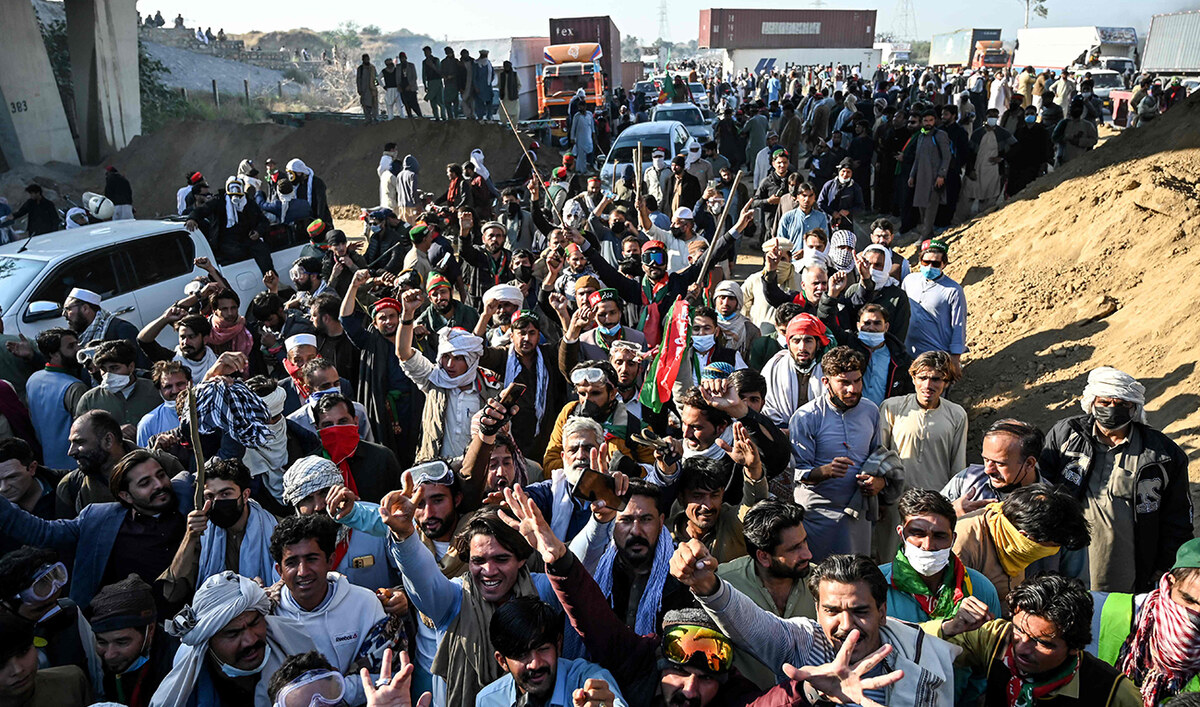
Inspector General (IG) Punjab, Dr. Usman Anwar, said on Monday that 119 cops had been injured, some of them due to gunfire by miscreants.
Speaking to reporters late Monday night, Interior Minister Mohsin Naqvi said the government had offered the PTI a designated place at Sangjiani area in Islamabad to protest.
“A head of state is in Islamabad, it is a sensitive [time], we do not want to go to an extreme step at D-Chowk,” Naqvi said, referring to the Belarusian president, who is in Islamabad with a high-level delegation.
“But do not cross the red line which forces us to go to that extreme step.”
US CALLS FOR PEACEFUL DEMONSTRATIONS
US State Department Spokesperson Matthew Miller reacted to ongoing protests in Islamabad, saying that Washington supports freedom of expression and the right to peaceful assembly in every country.
“We call on protesters to demonstrate peacefully and refrain from violence, and at the same time, we call on Pakistani authorities to respect human rights and fundamental freedoms, and to ensure respect for Pakistan’s laws and constitution, as they work to maintain law and order,” the Miller said.
He declined to comment when a reporter asked him whether it looked like Pakistan’s future was heading in the same direction as that of Bangladesh, where protests this year toppled Sheikh Hasina’s government and forced her into exile.
‘TILL MY LAST BREATH’
The PTI march started on Sunday but could not reach Islamabad the same day as shipping containers placed by the government on key points on major highways slowed the pace of the caravans. The PTI says its final destination is D-Chowk, a high-security area in the capital’s Red Zone that houses key government buildings and is a popular site for protests.
The largest PTI protest caravan began its journey from Peshawar, the provincial capital of the Khyber Pakhtunkhwa (KP) province where Khan’s party is in power. It is being led by KP Chief Minister Ali Amin Gandapur and Khan’s wife Bushra Khan, who was released on bail in October after nearly nine months in detention.
Khan has been in jail since August last year and faces a slew of charges he says are politically motivated.
“Until Khan does not return to us, we will not end this march,” Bushra said to supporters from atop the protest caravan on Monday afternoon.
“I will stand there till my last breath, you people have to stand by me. I will keep standing even if nobody does because this does not concern just my husband but the country and its leader.”
Islamabad police has confirmed over 400 arrests related to the protest in the past few days, saying the detainees were being held in different police stations. The PTI said over 3,500 of its leaders and supporters had been arrested in connection to the protests.

The PTI’s march has coincided with a visit to Islamabad by Belarusian President Aleksandr Lukashenko and a 68-member delegation to discuss investment deals. The government has accused the PTI of trying to sabotage the foreign visit in a bid to destabilize its economic recovery efforts.
The PTI rejected this criticism, saying its protest had been called before the announcement of the Belarusian delegation’s visit.
‘Give us another solution,’ Balochistan CM asks opponents of military operation against separatists

- Government has announced operation but not shared details of scale, scope, whether it will be joint effort with China
- Analysts say military solutions will not work in Balochistan, plagued by low-level separatist insurgency since decades
QUETTA: Sarfraz Bugti, the chief minister of Balochistan, on Monday asked opponents of a planned military operation against separatists in the insurgency-plagued southwestern province to suggest another solution to a surge in militant attacks, saying the armed campaign would target “terrorists and their camps.”
The province has seen a rise in deadly attacks that have targeted both citizens and security forces in recent months, including a series of coordinated assaults in August in which over 50 people were killed and a suicide bombing last month that targeted Pakistani army troops at a railway station, killing 27, including 19 soldiers, who were in civilian clothing.
Last Tuesday, the federal government announced that it would launch a “comprehensive” military operation to stem the rising tide of separatist militancy, though many political parties, civil rights groups and citizens have questioned the chances of the armed campaign’s success in the vast province.
“Obviously, this will be a targeted operation and the operation will be against those who are committing this terrorism, there will be operations against the terrorist camps,” Bugti said in response to questions by reporters.
“My question to all political parties is that if any other solution is seen emerging against this terrorism, then the government and the state of Pakistan are ready for this solution. These nationalist parties should tell us that solution … If any other political party knows any other solution, I ask them to tell the government.”
The statement from the prime minister’s office last week announcing the launch of the operation did not give any details, including which security forces would take part, whether the campaign would be limited to ground operations or could involve the air force, when it would be launched and in which parts of the vast, remote Balochistan province. It also did not mention if the plan would be a joint effort with Beijing, since Balochistan is home to key Chinese Belt and Road projects, and there has been a rise in attacks on Chinese nationals and interests in the region.
Pakistan’s military already has a huge presence in Balochistan, which borders Afghanistan and Iran and is home to a decades-long separatist insurgency by militants fighting for a separate homeland to win a larger share of benefits from the resource-rich province. The government and military deny they are exploiting the province’s mineral wealth or ignoring its economic development.
The military has long run intelligence-based operations against insurgent groups, the most prominent being the Baloch Liberation Army (BLA), which has escalated attacks in recent months on the military and nationals from longtime ally China.
The region hosts the Gwadar Port, built by China as part of the China-Pakistan Economic Corridor (CPEC), a $65 billion investment in President Xi Jinping’s Belt and Road infrastructure initiative to expand China’s global reach.
In addition to the recent attacks, the BLA also claimed a suicide bombing last month outside the international airport in the southern port city of Karachi that killed two Chinese engineers.
Ethnic Baloch separatists have launched several insurgencies in Balochistan since the birth of Pakistan in 1947, including from 1948-50, 1958–60, 1962–63 and 1973–1977. An ongoing low-level insurgency began in 2003. The army has launched several military campaigns in response, including as early as 1948 in the state of Kalat and a five-year-long operation in the 70s under Prime Minister Zulfiqar Ali Bhutto.
“Many political governments have come and gone in Balochistan but the operation has continued,” Sardar Akhter Jan Mengal, head of the Balochistan National Party (BNP) and a prominent Baloch nationalist leader in the province, told Arab News last week. “No one can resolve Balochistan’s political issue with military operations.”
Indeed, political leaders and independent analysts have for years urged the government to take a holistic approach to resolving Balochistan’s problems, which they say stems from decades of economic deprivation and political disenfranchisement. The province, which comprises 44 percent of Pakistan’s total land mass, is its most backward by almost all economic and social indicators.
Rich in land and mineral wealth, most parts of the region often lack even the rudiments of modern life. For instance, though home to Reko Diq, one of the world’s largest undeveloped copper and gold deposits, and the site of major Chinese investment projects, the province lacks employment opportunities and basic facilities like Internet, health and education.
Balochistan is also the least represented in Pakistan’s parliament, where legislative seats are allocated to provinces according to their population. Balochistan has a population of only 14.89 million people in a country of over 240 million and is hence allocated only 16 National Assembly seats. Punjab, with a much smaller land area but a population of 127.68 million, gets 141 seats.
Elephant Madhubala to reunite with cousins today after 15-year separation

- Madhubala, one of only three captive elephants in Pakistan, was brought from Tanzania in 2009 along with three other elephants
- She and her companion, Noor Jehan, were then brought to Karachi Zoo, Noor Jehan died last year, leaving Madhubala alone
KARACHI: Elephant Madhubala is set to be reunited with her cousins at Karachi’s Safari Park sanctuary today, Tuesday, after being separated from them for 15 years and spending the last year alone, an animal welfare organization said.
Named after a legendary Indian actress, Madhubala, one of only three captive elephants in Pakistan, was brought to the country in 2009 along with three other elephants from Tanzania. She and her companion Noor Jehan were separated from their kin about a decade and a half ago and moved to the Karachi Zoo.
Noor Jehan passed away in April 2023 at the age of 17 after being critically ill due to neglect, leaving Madhubala alone at the zoo since then. Animal rights organizations have since campaigned for Madhubala to be shifted to the Safari Park, saying the solitary life was taking a toll on her health.

A team from FOUR PAWS International, a Vienna-based animal welfare organization, has arrived in Karachi to oversee Madhubala’s transfer to the sanctuary on Tuesday.
“I’m excited to see how Madhubala will react when she meets her cousins,” Dr. Amir Khalil, director of reveal and rescue at FOUR PAWS, told Arab News.
“Imagine someone who hasn’t seen their siblings in fifteen years — how will she feel when they finally reunite?”
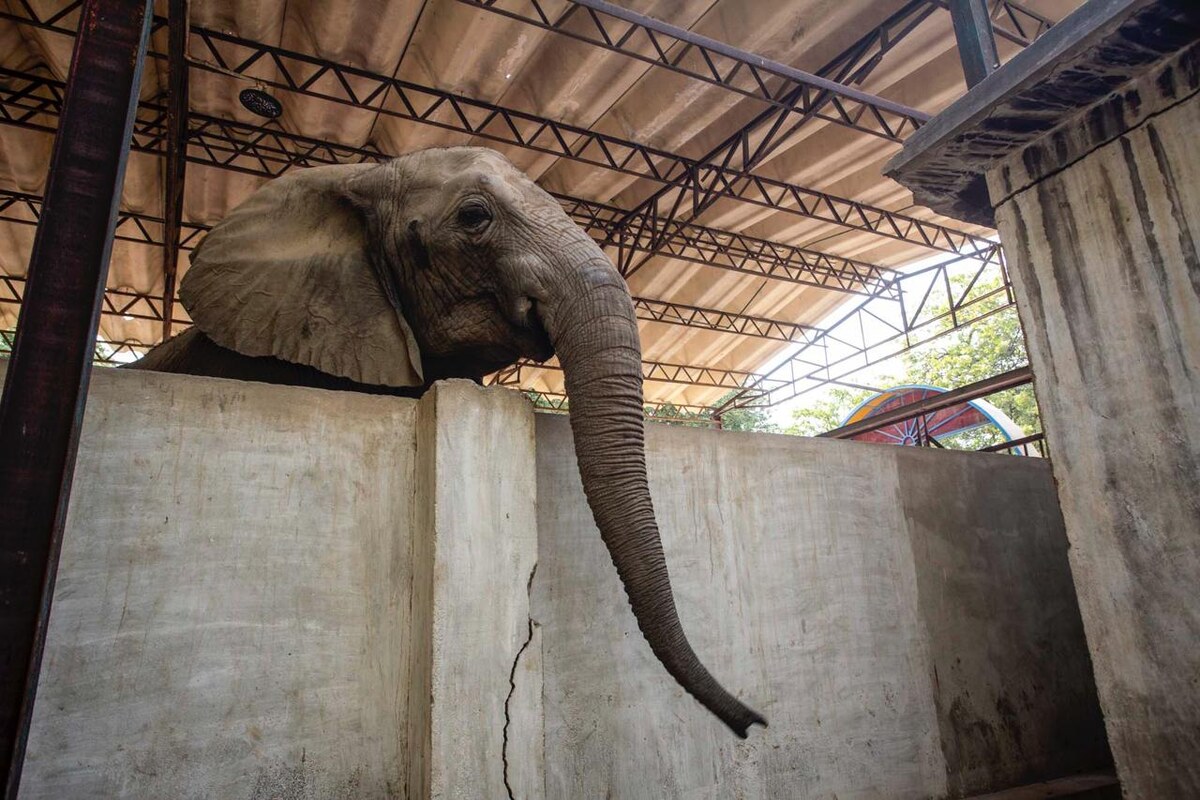
FOUR PAWS said in a statement last month that the adaptation work at Karachi’s Safari Park had reached its final stage.
Madhubala will be carried from the Karachi Zoo to the Safari Park in a huge transport crate. The elephant has been trained to enter and exit the crate by herself and sit inside it during the move.
“As part of the final preparations, the focus now lies on completing the landscaping of the elephant enclosure at Safari Park, finalizing enrichment features, and continuing the necessary training of the three elephants, including resuming crate training for Madhubala,” FOUR PAWS said.
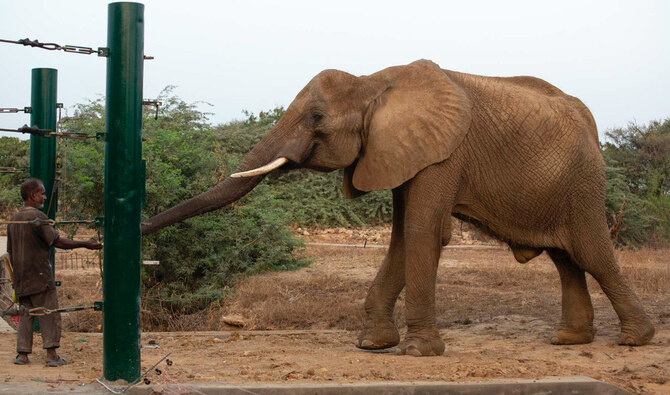
The elephant enclosures at Safari Park will have water elements for bathing, skincare and thermoregulation. Enrichments such as hay nets, varying substrates like soil, sand, clay, and sawdust will be provided for Madhubala to dust bathe. The area has also been secured by elephant-proof fencing.
Animal rights activists have long campaigned about the plight of animals in Pakistan, especially elephants, and demanded they be shifted to “species-appropriate” locations such as the Safari Park.
